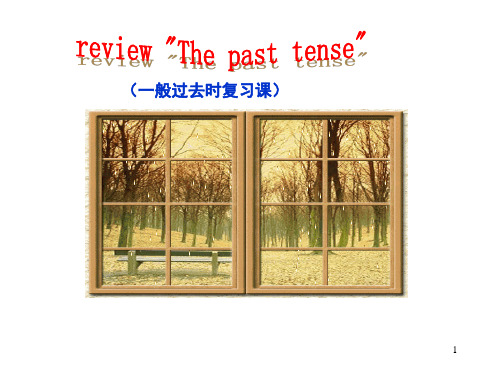2014届中考英语专题复习课件:一般过去时(人教新目标版)
合集下载
【备考2014】2014中考英语专题复习_专题二_被动语态课件_人教新目标版

课标(RJ)
┃重点解读┃
一、被动语态的构成和形式 过去分词 。助动词be 1.构成: 助动词be+及物动词的 ___________ 随着主语的人称,数,时态和语气的不同而变化。
2.形式: 常见的被动语态形式如下(以teach为例):
(1)一般现在时: am/ is/ are+taught (2)一般过去时: __________ was/were +taught (3)一般将来时: will/ shall+_____ be +taught (4)含有情态动词: 情态动词+be+taught:
课标(RJ)
3.主动语态表被动含义
feel, look, appear, sound, taste, smell等由实义动词演变而 形容词 来的系动词,后接 _________ (形容词 / 副词)作表语,主 动语态表被动含义。如: Tell me if you feel cold.
你要是感到冷就告诉我。
A. were made to work
C. made to work Most Beautiful Teacher”. A. is called
B. asked to work
D. were asked for work
( A )4. Zhang Lili is very brave and she ________“The
5.The parents named the child Li Ling.
_________________________________________ The child was named Li Ling (by the parents).源自课标(RJ)专项训练
Ⅱ.单项选择
( C )1. [2012· 遵义] Nick ________ a job in a bank, but to our
┃重点解读┃
一、被动语态的构成和形式 过去分词 。助动词be 1.构成: 助动词be+及物动词的 ___________ 随着主语的人称,数,时态和语气的不同而变化。
2.形式: 常见的被动语态形式如下(以teach为例):
(1)一般现在时: am/ is/ are+taught (2)一般过去时: __________ was/were +taught (3)一般将来时: will/ shall+_____ be +taught (4)含有情态动词: 情态动词+be+taught:
课标(RJ)
3.主动语态表被动含义
feel, look, appear, sound, taste, smell等由实义动词演变而 形容词 来的系动词,后接 _________ (形容词 / 副词)作表语,主 动语态表被动含义。如: Tell me if you feel cold.
你要是感到冷就告诉我。
A. were made to work
C. made to work Most Beautiful Teacher”. A. is called
B. asked to work
D. were asked for work
( A )4. Zhang Lili is very brave and she ________“The
5.The parents named the child Li Ling.
_________________________________________ The child was named Li Ling (by the parents).源自课标(RJ)专项训练
Ⅱ.单项选择
( C )1. [2012· 遵义] Nick ________ a job in a bank, but to our
人教版新目标英语七年级《一般过去式》课件

am(is) →was are →were 肯定句:He was at home yesterday. 否定句:He wasn’t at home yesterday. 疑问句:Was he at home yesterday? Yes, he was./No, he wasn’t.
am(is) →was are →were 肯定句:They were tired yesterday. 否定句:It wasn't rainy last Sundy. 疑问句:Were you happy last night? Yes, I was . /No, I wasn't .
3
live
4
start
5
practice
6
plan
一般过去时:规则变化
1Hale Waihona Puke try2use
3
want
4
visit
5
prefer
6
wait
规则动词-ed的读音 清念 /t/ ,元浊/d/ ; 说明: /t/ /d/ 之后念/id/
1、清念 /t/ ,即 ed 在清辅音后面念 /t/ ,例:finished helped passed cooked
肯定句:主语+ was/were +其他. 否定句:主语+was/were+ not +其他. 疑问句: Was/Were +主语+其他?
不规则变化 口诀五
5.以ould结尾的过去式有3个情态动词。
can--could shall--should will--would
不规则变化 口诀六
6.形式不变: 必须(must)让(let)他们放(put)下切(cut)刀来读(read)书.
2014中考英语一轮复习:语法互动(10)-时态和语态课件

2.现在进行时 (1)结构: am/is/are+动词的ing形式 (2)现在分词的变化规则: ①一般直接加ing。如:play—playing。 ②以不发音字母e结尾的,去e加ing。如: come—coming; make—making; live—living。 ③以重读闭音节结尾,末尾只有一个辅音字母的,先 双写该辅音字母,再加ing。如: run—running; sit—sitting; begin—beginning ④特殊:die—dying; lie—lying; tie—tying。
(3)用法: ①表示事实、现状、性质或经常性、习惯性的动作。常与 seldom, often, usually, always, sometimes, today, every day, once a week, every five minutes, on Sundays等时间状语连用。 如: I go to school at seven every day. 我每天七点去上学。 ②表示普遍真理和客观事实。如: goes around the sun. 地球绕着太阳转。 The earth ______________ ③表示在现在时间里所发生的一个动作。如: Here comes the bus. 公共汽车来了。 ④在时间和条件状语从句中代替一般将来时。如: I'll go shopping with my mother if she ________ is free tomorrow. 如果明天我妈妈有空,我将和她去购物。
④“be going to+动词原形” 也可表示将来时。 a.表示主观意愿、打算等。如: He's going to learn English next term. 下学期他打算学英语。 b.根据已有迹象推测可能要发生的情况。如: is going to rain. Look at the black clouds!It __________ 看那些乌云!马上要下雨了。 ⑤there be 结构的一般将来时为“there will be或 there is/are going to be”。
【备考2014】2014中考英语专题复习_专题一_情态动词课件_人教新目标版

一种表示虚拟语气, 使语气更加委婉、客气或对可能性的怀
疑。如: Might I borrow some money now? 我可以借点钱吗? He might be alive. 他可能还活着。
3.must 意为“必须, 应该, 一定, 准是”,表示说话人认 为 有必要做某事。must 用在一般现在时和一般将来时中,过 去时中可用 have to 的过去式代替。如:
—No, you needn't./Yes, you must.
“我必须现在回家吗?” “不,你不必。”/“是的,你必须回家。”
4.need 作情态动词, 表示 “需要、必须”。主要用于否 定 句和疑问句中,否定形式为needn‘t,表示“没有必要、 不
必”。用need 提问时,肯定回答为must,否定回答为
( C )3. —Dick, ________ I use your edictionary?
—Yes, please. ________ you give it to Mike after you use it? A. will; Would C. can; Could B. may; Might D. shall; Should
A. may be
B. must be
C. can't be
( C )2. [2012· 遵义] —I can't stop playing computer games. —For your eyes, my boy, I'm afraid you ________. A. can B. may C. have to
你需要做的就是填好这个表格。
二、情态动词表推测
情态动词中的must, can, could, may, might都可表推测。 其中must的可能性最大,can/could次之,may/might最小。 must的用法: (1)表示推测“可能性”时,意思是“一定、准是”,语气较
【英语人教版】2014年最新中考复习课件---九年级

Unit nted ? By the time I got outside, the bus had already left .
阶段综合测试卷二(Units 1—10) Unit 11 Could you please tell me
where the restrooms are?
Unit 12 You’re supposed to shake hands. Unit 13 Rainy days make me sad.
Unit 14 Have you packed yet?
Unit 15 We’re trying to save the manatees! 阶段综合测试卷三(Units 1—15)
英语·新课标(RJ)
Unit 1 ┃ 能力提升训练
Ⅱ.完形填空 There are four key points to study English: listening, speaking, reading and writing. Firstly, we should be brave to talk with others __1__English. By doing this, we can__2__ our speaking and listening skills. Secondly, we should try to __3__all kinds of English programmes as __4__as possible. In this way, we can gradually improve our__5__. Thirdly, we should often read English books. When we __6__ a new word, we should __7__ its meaning through the context (上下文) first. Then look it up in the __8__ to have a check. I think it is a good way of reading.
2014版中考一轮复习英语精品课件人教版九年级上下册

good
sport
we
many
club
more
class
interesting boring
fun
difficult
relaxing has great collection but
only them every day play sports
talk about
Unit 6
句子 询问所喜欢的东西 1. Do you like….? Yes, I do. /No, I
熟读
课本 P42G. F., P 43 3a ,P441b, P45 3a .
词汇
how much pants (pl) sock shirt shorts(pl) sweater shoe skirt sale dollar black white red green blue yellow big small short long clerk help want welcome example clothes(pl) store come buy very price each anybody afford our see yourself sell from sorry have a look on sale(廉价出售) ten eleven twelve thirteen fifteen sixteen seventeen eighteen nineteen twenty thirty Here you are.
核心知识 1. take 与bring 的区别 2. there be 的用法 3. on the wall 4. 介词:on , in , under , behind , next to ,
between…and… 5. 认识特殊疑问句的句式
中考英语专题讲解课件:一般过去式复习(共30张PPT)

中考英语专题讲解课件:一般过去式 复习(共 30张PP T)
9
中考英语专题讲解课件:一般过去式 复习(共 30张PP T)
When , How, why
ThTehyewy ewnetnttottohtehbeebaecahchb.y plane on MaorncMhatrhcehftihftehfi,f2th00,250b05ecause there wabsyapclaonnecert .
中考英语专题讲解课件:一般过去式 复习(共 30张PP T)
11
中考英语专题讲解课件:一般过去式 复习(共 30张PP T)
They saw a film/watched a movie. Th2eyyewarastachgeod a movie 2 years ago ibnienBctaehtucheaseeummseooiitsstttwweaeaxsxsppWveevehnneerssrnyiyivv,weewwochnioendrcneeeidn,mreWefuarmhfluyal
Titanic 泰坦尼克号 12
中考英语专题讲解课件:一般过去式 复习(共 30张PP T)
中考英语专题讲解课件:一般过去式 复习(共 30张PP T)
When , how often, why
BW pdWialotnahwyhbyeteiehpncndeeliahnhnyecaeteeohwddwtmeaabapycnsasuoeriitmn.tnebpGrGaurgrrataa.edmdreeeg77sa,mtBewsoibce a
中考英语专题讲解课件:一般过去式 复习(共 30张PP T)
8
中考英语专题讲解课件:一般过去式 复习(共 30张PP T)
中考复习课件---一般过去时教学课件 (共15张PPT)

1. Jack _________(come) home last Monday. came
2. I __________(visit ) Beijing last year. visited
3. Kate ________(has) lots of chocolate biscuits last night. had
PRACTISE
改写句子: 1、Lucy did her homework at home.(变否定句)
That’s great√
பைடு நூலகம்
Lucy didn’t do her homework at home. __________________________________________ 2、He ate meat for dinner yesterday.(变一般疑问句) __________________________________________ Did he eat meat for dinner yesterday? 3、She watched TV last night.(对划线部分提问) What did she watch TV last night? ___________________________________________ 4、There was some juice in the cup.(变否定句) There wasn’t any juice in the cup. ___________________________________________ 5、Amy’s parents were young then.(变一般疑问句) Were Amy’s parents young then? __________________________________________ 6、He was very fat many years ago.(对划线部分提问)
2. I __________(visit ) Beijing last year. visited
3. Kate ________(has) lots of chocolate biscuits last night. had
PRACTISE
改写句子: 1、Lucy did her homework at home.(变否定句)
That’s great√
பைடு நூலகம்
Lucy didn’t do her homework at home. __________________________________________ 2、He ate meat for dinner yesterday.(变一般疑问句) __________________________________________ Did he eat meat for dinner yesterday? 3、She watched TV last night.(对划线部分提问) What did she watch TV last night? ___________________________________________ 4、There was some juice in the cup.(变否定句) There wasn’t any juice in the cup. ___________________________________________ 5、Amy’s parents were young then.(变一般疑问句) Were Amy’s parents young then? __________________________________________ 6、He was very fat many years ago.(对划线部分提问)
- 1、下载文档前请自行甄别文档内容的完整性,平台不提供额外的编辑、内容补充、找答案等附加服务。
- 2、"仅部分预览"的文档,不可在线预览部分如存在完整性等问题,可反馈申请退款(可完整预览的文档不适用该条件!)。
- 3、如文档侵犯您的权益,请联系客服反馈,我们会尽快为您处理(人工客服工作时间:9:00-18:30)。
Thank you for listening!
一般过去时
一、一般过去时用法
过去活动 I saw him yesterday.
过去状态 I was in Grade One last year. 过去连续 She picked it up and went out. 活动
一般过去时的用法详解:
A.一般过去时主要表示过去发生的动作或情 况(包括习惯性动作) 。
二、动词过去式的构成
一般过去时常由动词过去式表示,规 则动词的过去式其变化规则如下: A.一般情况下在动词词尾加ed
work—worked want—wanted B. 以不发音的e结尾的动词,直接加 d。 live-lived hope-hoped
C.以“辅音字母+y结尾的动词”, 变y为i,再加ed。
Exercise
1.I can’t find my took pen.Who_____it?(take) lost 2. I______my bike,so I have to walk to school.(lose) sat 3. He______down and began to read his newspaper.(sit) buy did 4. When______you______the car?In 1998.(buy)
What time did you get up yesterday morning?
B.有些情况,发生的时间不很清楚,但 实际上是过去发生的,也应当用过去时 态。
I didn’t know you were so busy. C.在谈到已故的人的情况时多用过去时。
Lu Xun was a great writer.
肯定句 否定句 疑问句
实义动词在构成否定式及疑问句时,一般都 借助助动词did。 Eg: 肯定句 他以前在那里工作。 I/You/He/She/They worked there 他以前不在那里工作。 否定句 I/You/He/She/They did not work there. 疑问句 他以前在那里工作吗? Did you/I/he/she/they work there?
study—stu末尾只有一 个辅音字母的动词,要双写词尾的 辅音字母再加ed。 stop—stopped beg--begged
2.一般过去时的两种构成
be有was, were两个过去式,was用于第一、 三人称单数,were用于其他人称。
Eg:她在那里。 She was there. 她不在那里。 She was not there. 她在那里吗? Was she there?
